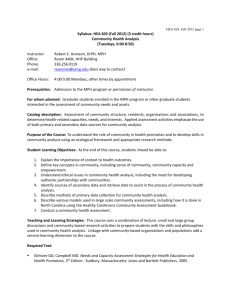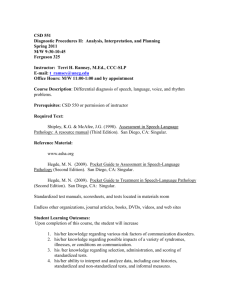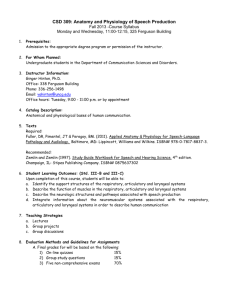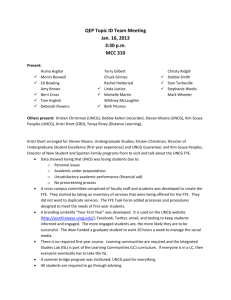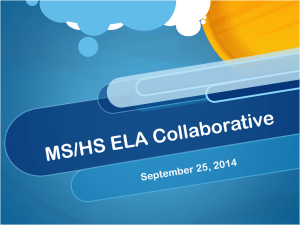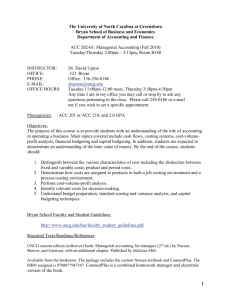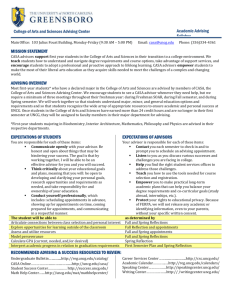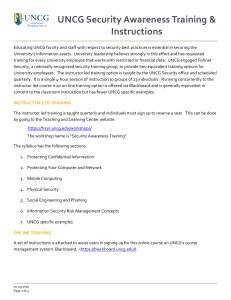101-01. Bowman
advertisement
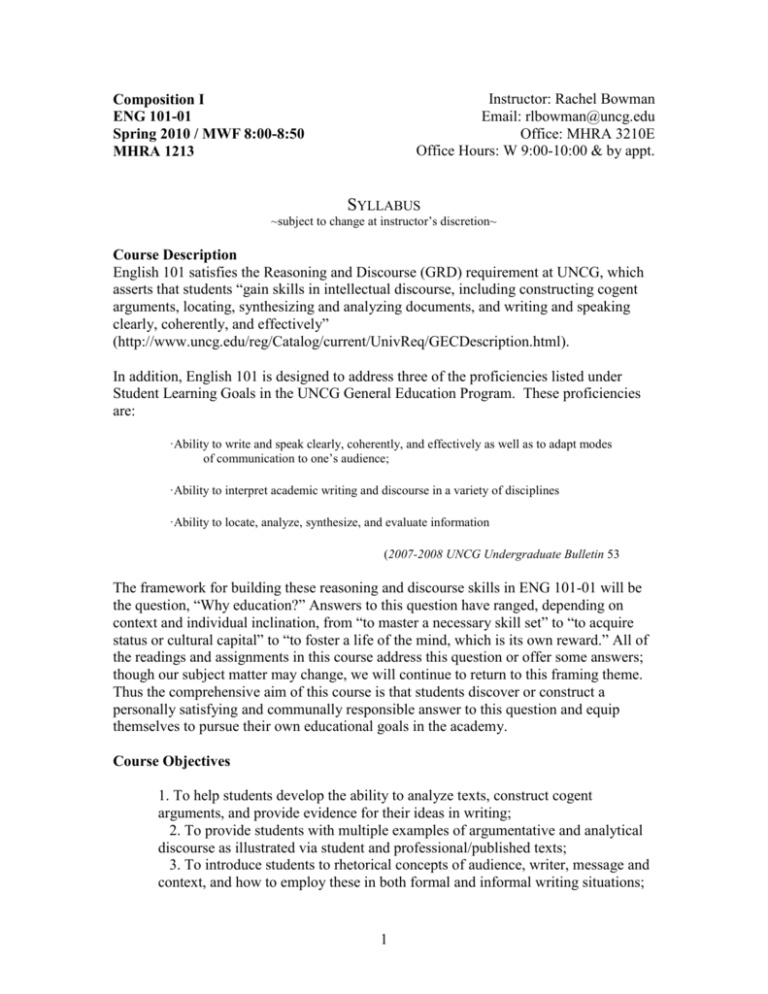
Instructor: Rachel Bowman Email: rlbowman@uncg.edu Office: MHRA 3210E Office Hours: W 9:00-10:00 & by appt. Composition I ENG 101-01 Spring 2010 / MWF 8:00-8:50 MHRA 1213 SYLLABUS ~subject to change at instructor’s discretion~ Course Description English 101 satisfies the Reasoning and Discourse (GRD) requirement at UNCG, which asserts that students “gain skills in intellectual discourse, including constructing cogent arguments, locating, synthesizing and analyzing documents, and writing and speaking clearly, coherently, and effectively” (http://www.uncg.edu/reg/Catalog/current/UnivReq/GECDescription.html). In addition, English 101 is designed to address three of the proficiencies listed under Student Learning Goals in the UNCG General Education Program. These proficiencies are: ·Ability to write and speak clearly, coherently, and effectively as well as to adapt modes of communication to one’s audience; ·Ability to interpret academic writing and discourse in a variety of disciplines ·Ability to locate, analyze, synthesize, and evaluate information (2007-2008 UNCG Undergraduate Bulletin 53 The framework for building these reasoning and discourse skills in ENG 101-01 will be the question, “Why education?” Answers to this question have ranged, depending on context and individual inclination, from “to master a necessary skill set” to “to acquire status or cultural capital” to “to foster a life of the mind, which is its own reward.” All of the readings and assignments in this course address this question or offer some answers; though our subject matter may change, we will continue to return to this framing theme. Thus the comprehensive aim of this course is that students discover or construct a personally satisfying and communally responsible answer to this question and equip themselves to pursue their own educational goals in the academy. Course Objectives 1. To help students develop the ability to analyze texts, construct cogent arguments, and provide evidence for their ideas in writing; 2. To provide students with multiple examples of argumentative and analytical discourse as illustrated via student and professional/published texts; 3. To introduce students to rhetorical concepts of audience, writer, message and context, and how to employ these in both formal and informal writing situations; 1 4. To help students develop the ability to summarize, paraphrase, and use direct quotations in writing; 5. To promote to student writers the value of writing-to-learn through sequenced assignments rooted in a common theme or focus; 6. To introduce students to the act of writing as a public and community-based process through the activities of drafting, peer review, and revision. Required Texts Graff, Gerald, and Cathy Birkenstein. “They Say / I Say”: The Moves that Matter in Academic Writing. New York: Norton, 2006. Print. [ISBN 9780393924091] Lyda, Laurie, Alan Benson, Will Dodson, and Katie Fennell, eds. Technê Rhêtorike: Techniques of Discourse for Writers and Speakers. 1st ed. Southlake, TX: Fountainhead, 2009. Print. [ISBN 978-1-59871-254-4] Various readings posted on Blackboard. You must print these and bring them to class on the day we discuss them. Academic Integrity “Academic integrity is founded upon and encompasses the following five values: honesty, trust, fairness, respect, and responsibility. Violations include, for example, cheating, plagiarism, misuse of academic resources, falsification, and facilitating academic dishonesty. If knowledge is to be gained and properly evaluated, it must be pursued under conditions free from dishonesty. Deceit and misrepresentations are incompatible with the fundamental activity of this academic institution and shall not be tolerated” (from UNCG’s Academic Integrity Policy). To ensure that you understand the university’s policy on academic integrity, review the guidelines and list of violations at <http://academicintegrity.uncg.edu>. I expect you to abide by the Academic Integrity Policy. Violations will result in failure of the assignment as well as a possible mark on your university record and/or failure of the course. Attendance/Lateness Policy Because much of the course’s activity takes place in class, attendance is paramount. Departmental policy states that students in MWF classes are allowed a maximum of three absences without a grade penalty. Four absences will result in a final grade lowered by one third of a letter (A will become A-), five absences will result in a final grade lowered by two thirds of a letter (A will become B+), and six absences will result in a final grade lowered by a whole letter (A will become B). Students who miss more than six classes will fail the course. Students are expected to arrive on time; consistent failure to do so will be counted as an absence. 2 Accommodations Students with documentation of special needs should arrange to see me about accommodations as soon as possible. If you believe you could benefit from such accommodations, you must first register with the Office of Disability Services on campus before such accommodations can be made. The office is located on the second floor of the Elliott University Center (EUC) in Suite 215, and the office is open 8am to 5pm, Monday - Friday. Telephone: 334-5440; e-mail: ods@uncg.edu. Writing Center The purpose of the Writing Center is to enhance the confidence and competence of student writers by providing free, individual assistance at any stage of any writing project. Staff consultants are experienced writers and alert readers, prepared to offer feedback and suggestions on drafts of papers, help students find answers to their questions about writing, and provide one-on-one instruction as needed. Located in the Moore Humanities and Research Building, room 3211. Online usage and citation guides are also available at <http://www.uncg.edu/eng/writingcenter>. I will offer extra credit—a third of a letter added to your participation grade—for a trip to the Writing Center to work on an assignment for any class. Simply ask the consultant to notify me in addition to your instructor for that class. *I encourage you to go as many times as are helpful, but your participation grade can only be raised by one third of a letter. Class Participation Class discussion is a place to stimulate new thinking, to speak and to see how others react to your thoughts, to watch the play of ideas in an arena specifically created for such play—it can be exciting and fulfilling. Or it can be very boring. The best way to have an interesting class discussion is to participate in it. And if the life of the mind isn’t enough incentive, there’s always your grade: class participation is 5% of your final grade. Classroom Conduct (Or: How to be a Decent Human Being) I expect a basic level of courtesy from all students in class. Talking while others are talking, disregarding instructions, and failing to take others’ views seriously all derail our purpose as a learning community, and I may ask students exhibiting disruptive conduct to leave. Use of cell phones, including text messaging, is prohibited in class. Laptops may be used in class only by students having a special need for purposes of note-taking or other classroom activities. Students with such a need should make specific arrangements with the instructor. No student may use a laptop in class without a prior arrangement with the instructor. One more thing: packing your bags before class is finished is rude. Don’t do it. 3 Class Preparation Because students will do a great deal of in-class writing as you prepare for longer out-ofclass assignments, you must bring a pen or pencil and paper to each class meeting. And because we will be discussing the assigned texts in detail and I will be expecting references to specific passages in these discussions, you must bring a hard copy of the reading for each meeting. This includes both books and texts on Blackboard; you must print electronic readings and bring them to class. To ensure that students read the assigned texts on time, short, open-book reading quizzes will be given at the beginning of class. These may consist of simple questions or instructions to write a short composition that demonstrates your knowledge of the text. Evaluation Individual assignments will be given a letter grade on the +/- system and the corresponding number on the university 4-point scale. A+ A AB+ B BC+ 4.3 4.0 3.7 3.3 3.0 2.7 2.3 C CD+ D DF/WF 2.0 1.7 1.3 1.0 0.7 0.0 Final grades will then be calculated using the following percentages: 20% Participation 5% reading quizzes 5% group presentation of a scholarly article 5% class participation: courtesy, good faith, willingness to engage with material 5% conferences: attendance, preparedness, engagement 40% Papers 5% education narrative (due 1/29; 2/1) 10% TS/IS paper (due 2/22; 3/5) 5% education paper, research portion (proposal due 4/16; paper due 4/23) 15% education paper, complete (5/5; 5/7 in portfolio) 5% rhetorical analysis (3/31; 4/7) 40% Portfolio *No late work will be accepted. Failure to turn in work on time will result in an F for the assignment. In case of truly unavoidable emergency, you may appeal this policy. Course Calendar January 18 Monday Wednesday Friday MLK Day No Class Introductions Bb: “Learning to Read and Write”; “The Tyranny of Choice” 4 January 25 Bb: “From Reading Lolita in Tehran” Bb: “Inequality and the American Dream”; “Stories Hollywood Never Tells” February 1 DUE: REVISED/EXPANDED EDUCATION NARRATIVE (4 P) TS/IS 1-27; bring readings from January 27 to class Bb: “What Do We Talk about When We Talk about Flow?” DUE: EDUCATION NARRATIVE (3 P); WORKSHOP TS/IS 28-37; Bb: “Aria” February 8 TS/IS 39-47; Bb: “Against School” TS/IS 51-63; TS/IS 64-72; Bb: “The Case for Working Bb: “Hidden Intellectualism”; with your Hands” “Living like Weasels” February 15 TS/IS 74-87; Bb: “The Walling of Experience” TS/IS 88-96; Bb: “Sex, Drugs, Disasters” TS/IS 101-148 February 22 DUE: TS/IS PAPER (5 P); WORKSHOP Conferences Conferences March 1 Conferences Bb: “That’ll Do, Comma” DUE: REVISED TS/IS PAPER (5 P) Spring Break No Class March 8 March 15 March 22 March 29 TR 184-201 Bb: “Arguments from the Bb: “Arguments Based on Heart”; “Arguments Based on Values”; “Arguments Based Facts and Reason” on Character” Bb: “Introduction to Eats, Shoots & Leaves”; TR 16-24; TR 47-54; Reading: the scholarly article “Introduction to Grammar Bb: “Dancing with Professors” you signed up to read Snobs are Great Big Meanies” DUE: GROUP PRESENTATIONS OF SCHOLARLY ARTICLE DUE: RHETORICAL ANALYSIS (3 P); WORKSHOP Spring Holiday No Class Class Meets in Library April 5 TR 169-175 DUE: REVISED RHETORICAL ANALYSIS (3-4 P) April 12 TR 110-123 TBA DUE: 5 SOURCES AND A PROPOSAL FOR THE EDUCATION PAPER April 19 Bb: Sample student papers TR 164-168 DUE: EDUCATION PAPER (RESEARCH) (5-6 P); WORKSHOP April 26 Conferences Conferences Conferences May 3 Look over TR 278-301; bring TR to class *DUE: EDUCATION PAPER (COMPLETE) (8-10 P); WORKSHOP Final Exam Period DUE: PORTFOLIOS * Tuesday, May 4 is the last day of classes and follows a Friday schedule. 5

